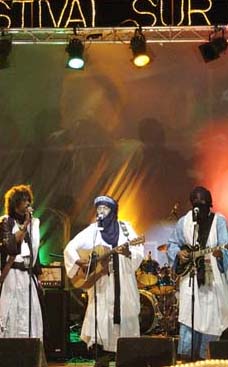
A fast-talking native of Manhattan, who would be mute without his arms, Newlin knows how to relate the complexities of wine to just about anyone. At age 42, he has been a Peace Corps volunteer in Yhu ("blackwater"), Paraguay, a cab driver at the height of the crack epidemic, a waiter at Brasserie Les Halles ("back when the celebrities still went there"), and an investment banker with Swiss Bank Corp., now UBS. He speaks five languages and is leading the IWC's first courses in Spanish this spring. He doesn't come across as a wine geek, and his classes are more about enjoying what's in the glass than figuring out what rootstock a vintner's using.
Paraguay RPCV Philippe Newlin lectures on wine
Drink With Newlin For a Solid A
By Matthew Daniel
Issue date: 3/28/07 Section: Arts &
Caption: Wine Bottles pianoforte Flickr Creative Commons Attribution-NoDerivs 2.0
"OK, so here's the thing. In South America, when these guys want to let you know that this is a serious wine, they put it in a really, really heavy bottle."
That kind of irreverent advice marks all of Philippe Newlin's lectures on wine. For two nights every week, he holds forth at the Business School and SIPA on the more exciting parts of the vinous world: the political economy of Spain, the open rebellions in Australia, the terroir-istes in Burgundy. As the tasting director for Wine & Spirits magazine and a long-time instructor at New York's International Wine Center and the Wine & Spirit Education Trust of London, Newlin has a story or two to spin.
While the courses, now in their fourth year, are taught at the graduate schools, enrollment is open to anyone of appropriate age. For $250 to $400, students receive eight classes, during which Newlin provides an overview of the major regions of the world and pours top-tier wines (a 1989 Vega Sicilia �nico, at $285 a bottle, recently found its way into the lineup). The courses are practical and approachable, and that's the point.
"These guys aren't worried about knowing the weather patterns in Bordeaux for the last 50 years," Newlin said. "They just want to know what to order when they're out with a client, so that they don't look like complete morons."
A fast-talking native of Manhattan, who would be mute without his arms, Newlin knows how to relate the complexities of wine to just about anyone. At age 42, he has been a Peace Corps volunteer in Yhu ("blackwater"), Paraguay, a cab driver at the height of the crack epidemic, a waiter at Brasserie Les Halles ("back when the celebrities still went there"), and an investment banker with Swiss Bank Corp., now UBS. He speaks five languages and is leading the IWC's first courses in Spanish this spring. He doesn't come across as a wine geek, and his classes are more about enjoying what's in the glass than figuring out what rootstock a vintner's using.
On a recent evening, Newlin stood before 30 students on the top floor of International Affairs Building, looking out at the blue and green spotlights flipping on at the Empire State Building. The topic was red Burgundy, mostly pinot noir, and he was explaining the enormous variations that occur in what is really a very small region. The information was comprehensive and concise, and the class was rapt.
From the back of the room, two assistants delivered generous pours to the students. They swirled, tasted, and generally ignored the white spit buckets lining each table for five minutes, and then it was time to discuss. A typical exchange:
Newlin: "This wine, as Don over here pointed out, is like running nude through a forest right before a rainstorm and rolling around in the earth. Somebody else said crawling in kitty litter."
Student: "How close are those experiences?"
Newlin: "Well, in a David Lynch film..."
And that's how it goes most nights. Newlin loves a crowd. He feeds off the raw wackiness that comes from mixing people and alcohol, even as he tries to maintain order and focus. The format of the class helps, with everyone seated in a semicircle around him, and the assistants only pour two wines at a time. There are notes on the blackboard, but the lecture is extemporaneous and always passionate.
"If you like strawberries, gamay is your wine," he says, twirling a Beaujolais Villages. "Put this one in your lunchbox." On a Vosne-Roman�e from C�tes de Nuits, "I mean, this could be a safety color on the highway." For pairing food with a Volnay: "You have those garlicky snails, and then you have that bright cherry fruit, and then you're like, oh yeah. Or you're like, yuck, because it's snails."
Surprisingly enough, this light approach wasn't born from childhood familiarity with great wine, though his mother is from France. "Growing up, I spent every summer in the Loire Valley drinking bad wine mixed with water," he says. "It was only as a banker visiting South Africa that I had really good wine, and chucked the beer in favor of this stuff."
Despite the loose structure, most of the course is focused on the practical side of things. After pouring the third and final round, he gives the temporarily restrained class his tips for enjoying wines as delicate and fragrant as pinot noir.
"In my opinion, and, I think, the opinion of most people who have had too much to drink, is that the really great thing about great wine is that it's really aromatherapy. What you really get out of really good wine is the beauty of the smell," he says, eyes lighting up as he breathes in a pinot noir from Chambolle-Musigny. "If you're interested in just getting drunk off of smell, then, in my opinion, there is nothing, nothing better than the wines from Burgundy. Except for me, perhaps."
The students, who hadn't exactly been spitting, erupt in laughter. He smiles, blushing a little. "12-and-a-half percent alcohol, and I'm still talking garbage."
















